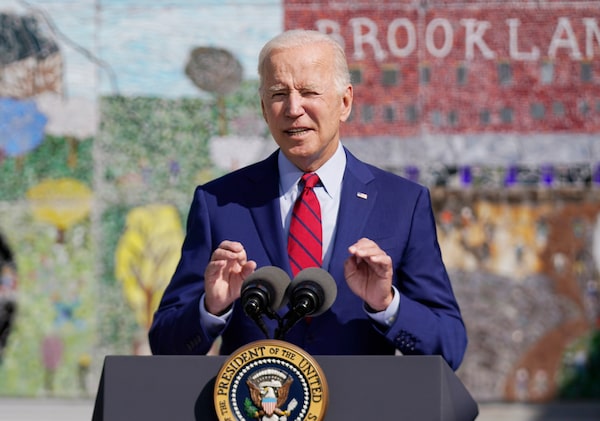
U.S. President Joe Biden speaks on Sept. 10 in Washington. Mr. Biden’s order that American businesses with more than 100 employees require their workers to be vaccinated has created new divisions in a country where contention seems to spread like the contagion itself, David Shribman writes.Manuel Balce Ceneta/The Associated Press
Over the weekend, Americans are marking with solemn unity the 20th anniversary of the terrorist attacks against Manhattan and Washington and the jetliner crash in a Pennsylvania field. At the same time they are tearing each other apart over whether the government has the right to force them to be vaccinated in the face of a terrifying threat that, every 36 hours, is killing as many Americans as 9/11 did.
In this phenomenon – commemoration accompanied by rebellion – the American dilemma of the third decade of the 21st century is coming into clear focus.
In some aspects, the contemporary American dilemma can be cast as a choice between science and myth, or between elites and populists, or, summoning an 1861 metaphor for a conflict 160 years later, even between Confederate states (where the Delta variant is galloping) and Union states (where it is less prevalent).
But in a more elemental sense, it is a reflection of a generations-old conflict between personal liberty and government authority – the very collision embedded in the American Revolution and countless conflicts through the years.
Often the conflicting sides begin with a strong vision and eventually fall into searing revisionism.
There is, to be sure, enormous second-guessing about the United States’ response to the al-Qaeda attacks; the hurried and frenzied withdrawal from Afghanistan that ended America’s longest war was only the most prominent element of that re-evaluation.
The curtailment of civil rights; the use of enhanced interrogation tactics that bordered on, or actually constituted, torture; the early botched efforts to kill Osama bin Laden; the broad commitment to nation-building – they all look different 20 years later. Even the rush toward aggressive airport security has taken on a new tint with the prospect, revealed only a day ago, that air travellers no longer may have to take off their shoes or empty their pockets when they cross security barriers.
Yet despite all the second-guessing about the early responses to the coronavirus threat – masks weren’t needed, then they were; physical surfaces were a contamination threat, then they weren’t; the vaccine would return the country to normality, then it didn’t – there is no second-guessing about the danger it poses to the public. The death toll from COVID-19 already is 50 per cent higher than the American death toll from the Second World War.
Now Mr. Biden’s order that American businesses with more than 100 employees require their workers to be vaccinated has created new divisions in a country where contention seems to spread like the contagion itself.
Mr. Biden says he has had enough, especially since, as he put it in his remarks announcing the vaccine mandate, “We have the tools to combat the virus if we can come together and use those tools.”
The reaction from his opponents: Lamentation and lawsuits.
Republicans called it overreach, the very term employed by military and academic analysts who, in this anniversary period, were taking a fresh look at the response by GOP President George W. Bush to the terrorist attacks of 2001. They said it was an emblem of government tyranny – an “authoritarian power grab,” in the phrase of Representative Elise Stefanik of New York, who displaced Donald Trump critic Liz Cheney as GOP conference chair – and employed words eerily reminiscent of those the Democrats used when Republicans proposed the Patriot Act, which expanded government surveillance.
And Republican state leaders mobilized to fight the Biden initiative, with South Dakota Governor Kristi Noem, a possible 2024 presidential candidate, saying her state “will stand up to defend freedom” and tweeting, “@JoeBiden see you in court.”
From the start of the COVID-19 era, the United States has been embroiled in a bruising conflict between notions of public health and principles of personal freedom.
It’s not as if Mr. Biden didn’t know that. In December, the month after he was elected and the month before the insurrection at the Capitol, the president-elect acknowledged the conflict. “No, I don’t think it should be mandatory,” he said of the vaccine, which was just beginning to be distributed. “I wouldn’t demand it be mandatory.”
Now he has moved in the other direction. That move came as it became clear that the last moment of American unity – the proliferation of flags, the sense of national horror transforming itself into a sense of national resolve after the 2001 terror attacks – was swiftly moving into the past.
Indeed, the 20th anniversary of 9/11 resembles nothing so much as the 20th anniversary of the 1941 attack on Pearl Harbor that drew the country into the Second World War, two years after Canadians had joined the conflict.
“We face entirely different challenges on this Pearl Harbor Day,” President John F. Kennedy, a veteran of Pacific battle in that war, said in remarks to the American Federation of Labor and Congress of Industrial Organizations Convention in Florida on Dec. 7, 1961.
“In many ways, the challenges are more serious, and in a sense long-reaching” the 35th president said in words that the 46th president might find appropriate, “because I don’t think that any of us had any doubt in those days that the United States would survive and prevail and our strength increase.”
Our Morning Update and Evening Update newsletters are written by Globe editors, giving you a concise summary of the day’s most important headlines. Sign up today.
 David Shribman
David Shribman